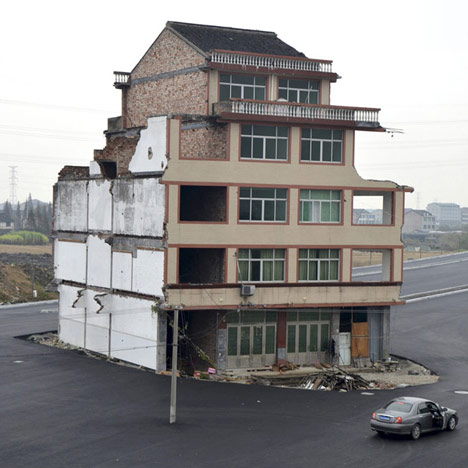News: a five-storey house that had stood for over a year at the centre of a Chinese motorway has finally been demolished.
Top: photograph is by Reuters/China Daily.
The house in Wenling, in China's Zhejiang Province, was one of over 400 properties that had stood in the path of the new road, but owner Luo Baogen was the only resident who refused to accept a compensation deal. Luo, 67, claimed that the offer wasn't enough to cover the cost of buying a new home.
As Luo and his wife remained in the house, the government constructed the new motorway around them and photographs of the bizarre scene subsequently went viral across the internet.
However, after meeting with Chinese officials on Friday, Luo was at last persuaded to sign the demolition agreement and accept the offer of 260,000 yuan (just over £26,000) and a site for a new house. "It was never a final solution for us to live in a lone house in the middle of the road. After the government's explanations, I finally decided to move," said Luo.
Above: photograph is by Jin Yunguo/Asianewsphoto
The owner and his wife moved out of the house immediately to allow the bulldozers to begin demolition.
Solitary properties left in the midst of development are a frequent occurrence in China and are referred to as Dīngzihù, or "nail house", meaning they are hard to get rid of like a stubborn nail. All land in China is owned by the state, so residents are rarely able to stay for long in these houses, especially as the officials have the power to remove their water and power supply.
Other recent stories from China include plans to construct the world's tallest building in just 90 days and a masterplan for Shenzhen that's larger than the whole of Manhattan.
Meanwhile Neri&Hu recently told Dezeen that their fellow architects in China are "lost" and need to stem the tide of "half-assed" building projects in the country, while Aric Chen, the creative director of Beijing Design Week, had previously warned that China needs to "slow down" and pay more attention to issues of authenticity, process and identity.
See all our stories about China »

